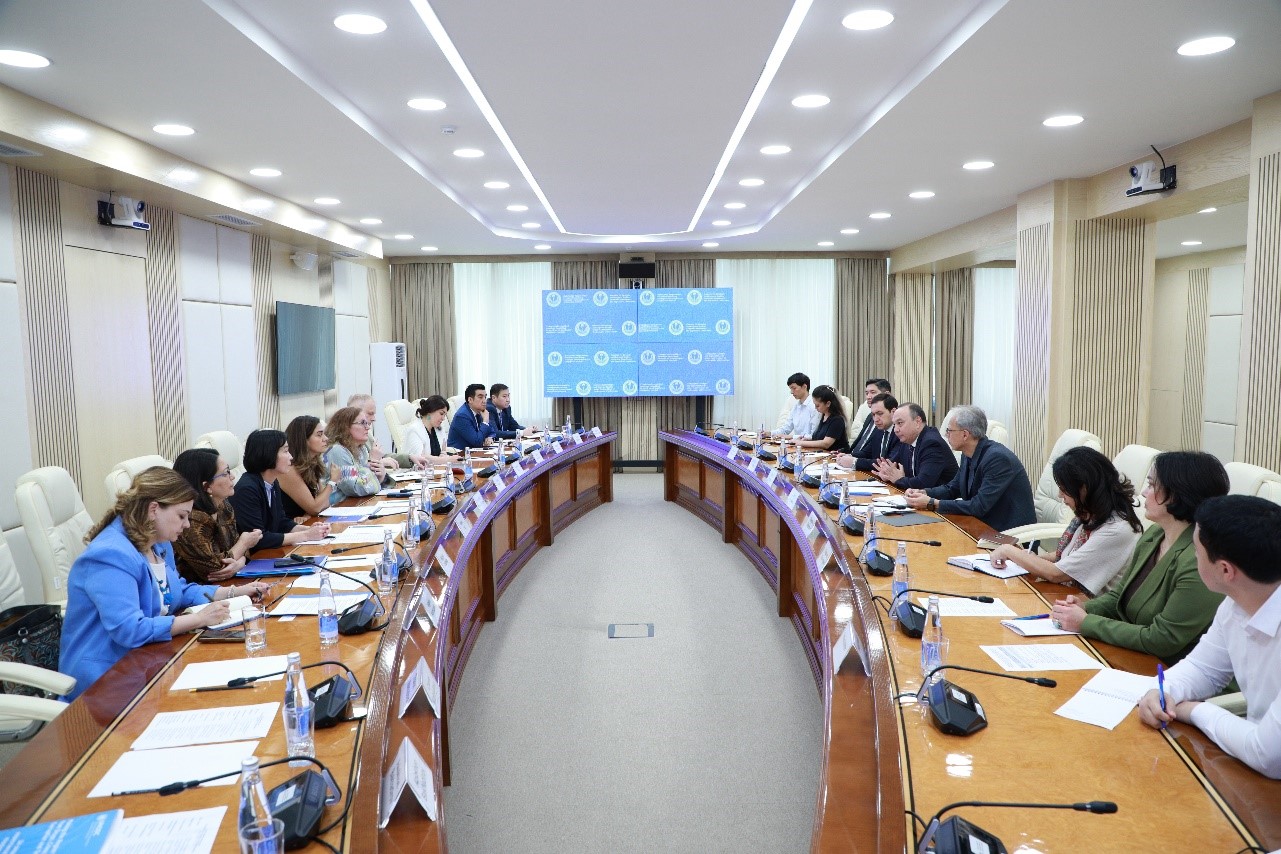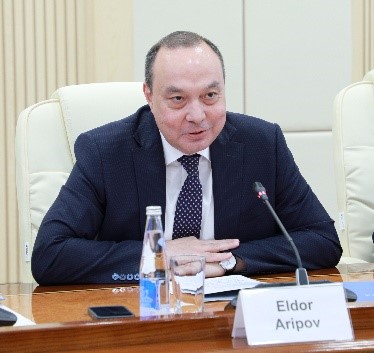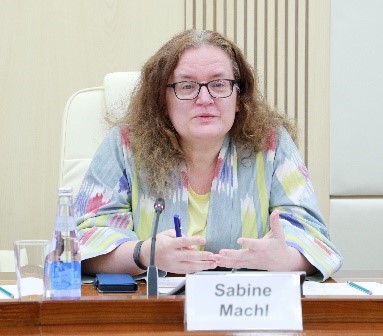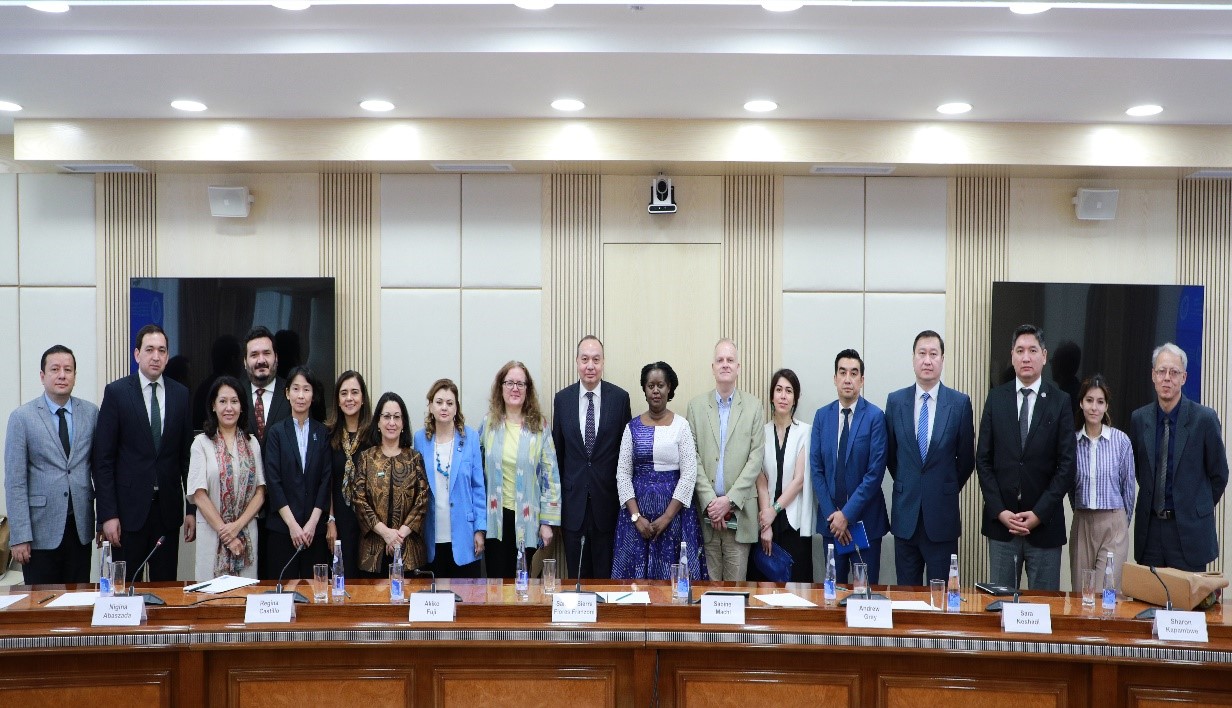ISRS hosted a meeting with UN representatives

On June 30, 2025, the Director of the Institute for Strategic and Regional Studies Eldor Aripov met with representatives of key UN departments in our country, including ILO, UNESCO, IOM, UNODC, UNAIDS, UNDP, UNICEF, WHO, FAO and UNFPA.
During the substantive negotiations, the parties discussed priority areas of cooperation, as well as prospects for its further expansion.
 Opening the meeting, Eldor Aripov stressed the importance of regular interaction with the UN to strengthen partnership and develop joint solutions on key issues on the global and regional agenda.
Opening the meeting, Eldor Aripov stressed the importance of regular interaction with the UN to strengthen partnership and develop joint solutions on key issues on the global and regional agenda.
In turn, UN Resident Coordinator in Uzbekistan Sabine Machl highly appreciated the country's contribution to addressing global challenges, including climate change and promoting gender equality. She expressed sincere gratitude to the leadership of Uzbekistan for its comprehensive support of the UN's activities. According to her, such interaction is important for promoting key priorities and achieving the Sustainable Development Goals (SDGs).
The meeting participants noted with satisfaction the high dynamics of cooperation between Uzbekistan and UN structures. It was emphasized that 166 joint programs and projects covering a wide range of priority areas are currently being implemented. In addition, thanks to Uzbekistan's initiatives, the UN General Assembly adopted 13 special resolutions, which confirms the growing international authority of the country.
In addition, the parties discussed in detail key areas of cooperation in the context of preparations for the 80th session of the UN General Assembly. Particular emphasis was placed on issues of countering climate challenges. The participants highly appreciated the active position of Uzbekistan in the field of environmental security, including such priority areas as combating land degradation and developing green technologies. These initiatives make a significant contribution not only to the sustainable development of the country, but also to the formation of a unified climate agenda at the regional level.
In the context of environmental challenges, measures to ensure food security were also discussed. It was noted that Uzbekistan is introducing innovative approaches in the agricultural sector and modernizing water supply systems, which is becoming especially relevant in the context of climate change and population growth.
The discussions addressed investment in the demographic dividend, highlighting plans for extensive efforts to create jobs, modernize the education system, and expand opportunities for youth self-realization. Uzbekistan remains a youthful nation, with 55 percent of its population under 30 years old. Forecasts indicate the working-age population (15–64 years) will grow from 23.6 million in 2023 to over 33 million by 2050.
The steps in the field of human rights, including the expansion of women's rights and strengthening their role in socio-political and economic life, were highly appreciated. Within the framework of the strategy "Uzbekistan-2030", large-scale measures are being implemented aimed at increasing the activity of women in the political, social and economic spheres. As a result, over the past five years, the number of businesswomen in Uzbekistan has doubled, while their share in various sectors of the economy and industry is about 50%.
Migration issues were addressed separately, emphasizing the importance of a safe and orderly migration policy focused on protecting citizens' rights and interests. Uzbekistan actively supports labor migrants, enhances social protection mechanisms, and promotes the legalization of employment abroad.
The guests acknowledged Tashkent's growing role in ensuring regional security. Particular attention was paid to the Afghan direction of the country's foreign policy. The consistent inclusion of the neighboring country in regional integration processes became fundamentally important.
The healthcare sector has received significant attention. Uzbekistan is implementing consistent reforms to enhance the quality and accessibility of medical care. Active collaboration with the WHO supports the adoption of international standards and the expansion of primary healthcare coverage.
Following the meeting, the parties confirmed their commitment to an open and sustainable partnership. They expressed their readiness to continue such meetings on a regular basis, which will allow for more effective coordination of joint actions and promotion of priority areas of interaction between Uzbekistan and the UN.







